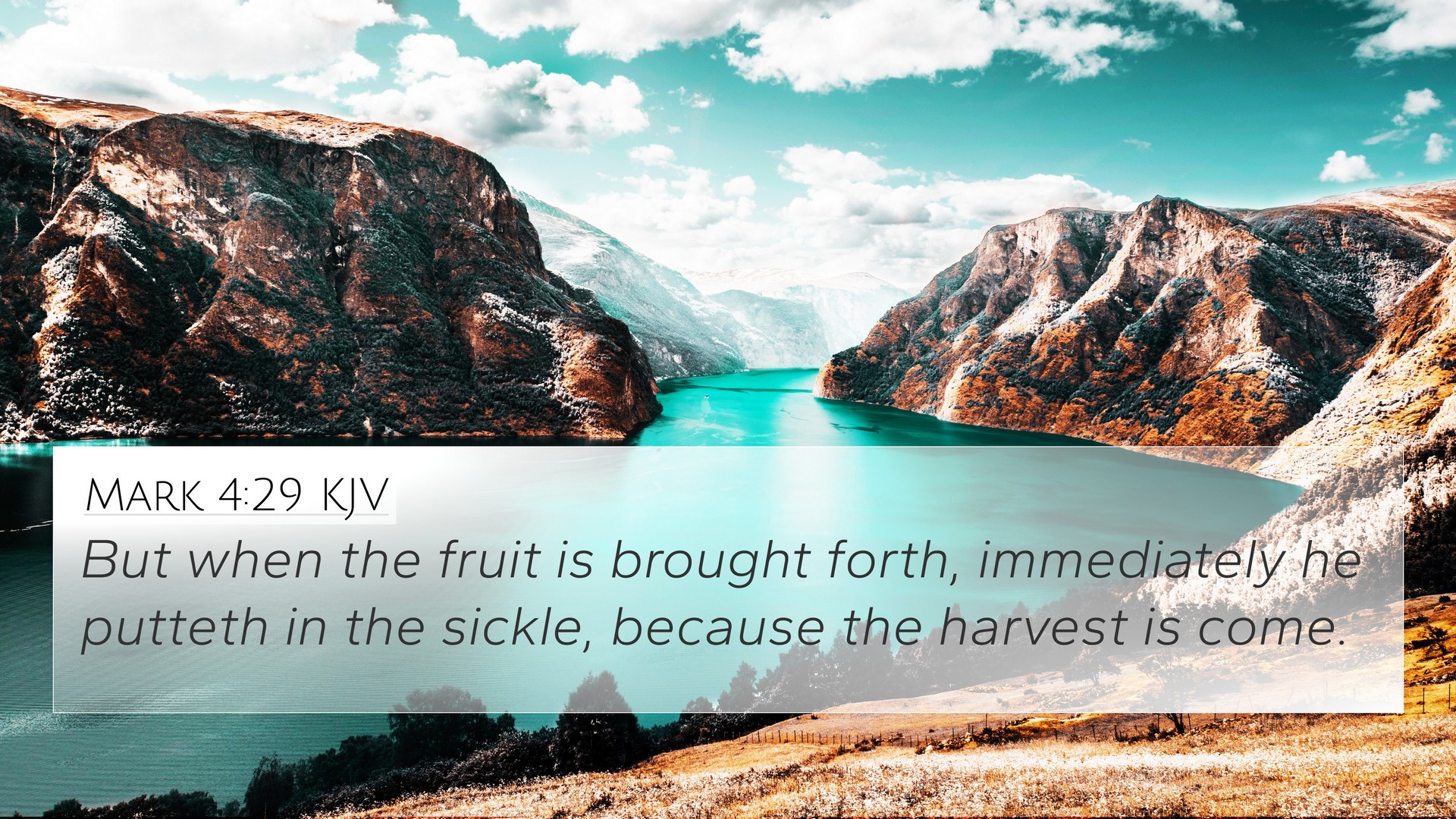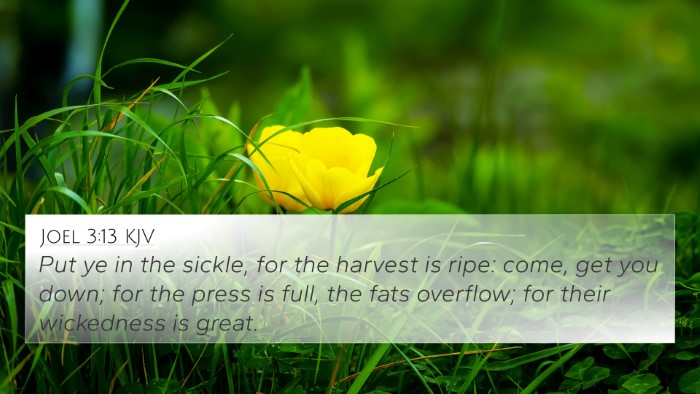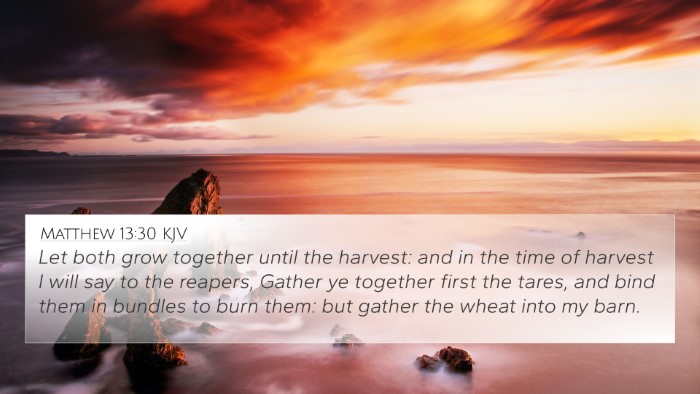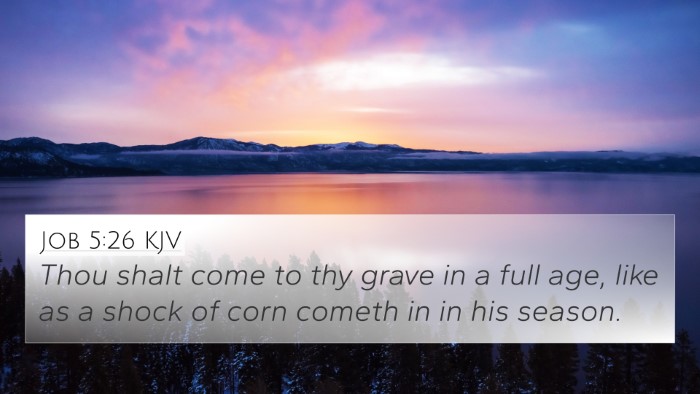Understanding Mark 4:29
Verse: "But when the fruit is brought forth, immediately he putteth in the sickle, because the harvest is come." - Mark 4:29 (KJV)
Summary of the Verse
This verse encapsulates the moment of harvest, illustrating the culmination of labor and waiting. The agricultural metaphor signifies the process of spiritual growth and maturity, indicating that the right time will come when efforts yield results.
Insights from Public Domain Commentaries
-
Matthew Henry:
Henry highlights the significance of timing in God’s kingdom. He asserts that after a period of growth, God will determine the suitable moment for gathering the fruits of one’s spiritual labor. This can serve as both an encouragement and a warning to believers regarding persistence and receptivity to God’s timing.
-
Albert Barnes:
Barnes explains the agricultural context more deeply, noting that the process of sowing, growing, and harvesting is reflective of the Kingdom of God. He emphasizes that just as plants take time to grow and bear fruit, so too do spiritual lives. The sickle being put forth illustrates God's readiness to gather His people when they are prepared.
-
Adam Clarke:
Clarke elaborates on the metaphor of harvest, associating it with the final judgment. He sees the sickle as a symbol for the reaping of souls, conveying both hope for the faithful and urgency for the lost. This reinforces the importance of evangelism and spirituality in the everyday life of Christians.
Bible Verse Cross-References
Mark 4:29 is interconnected with various other scripture passages that echo the themes of growth, harvest, and divine timing:
- Matthew 9:37-38: Jesus states, "The harvest is plentiful, but the laborers are few." This emphasizes the need for more workers to bring in the harvest.
- Galatians 6:9: "And let us not be weary in well doing: for in due season we shall reap, if we faint not." This verse assures believers that perseverance in doing good will result in a harvest.
- John 4:35: "Say not ye, There are yet four months, and then cometh harvest? behold, I say unto you, Lift up your eyes, and look on the fields; for they are white already to harvest." It encourages immediate action in witnessing and serving.
- Revelation 14:15: "Thrust in thy sickle, and reap: for the time is come for thee to reap; for the harvest of the earth is ripe." This reinforces the idea of God's timing in gathering His people at the fulfillment of all things.
- Isaiah 32:10: "Many days and years shall ye be troubled, ye careless women: for the vintage shall fail, the gathering shall not come." It speaks of both urgency and the consequences of neglecting the call to harvest.
- James 5:7: "Be patient therefore, brethren, unto the coming of the Lord. Behold, the husbandman waiteth for the precious fruit of the earth, and hath long patience for it." This verse connects the waiting for harvest with spiritual patience and expectation.
- 1 Corinthians 3:6-9: Paul discusses how he planted, Apollos watered, but God gave the increase, indicating that growth and harvest are ultimately under God's authority.
Thematic Bible Verse Connections
The verse from Mark about the harvest serves as a pivotal connection to broader Biblical themes, including:
- Spiritual Growth: The process of growth and maturity is common in parables and teachings on faith.
- Divine Timing: Many scriptures reflect on the proper timing of God and how humans should respond accordingly.
- Harvest Imagery: The Bible frequently employs agricultural illustrations to convey spiritual truths, emphasizing readiness and productivity.
Tools for Bible Cross-Referencing
To fully explore the connections between Bible verses, the following tools can assist you:
- Bible Concordance: A tool that lists words and their occurrences throughout the Bible, aiding in finding verses related to a specific word or theme.
- Bible Cross-Reference Guide: A helpful reference that links related scriptures across both the Old and New Testaments.
- Cross-Reference Bible Study: A methodical approach to studying the Bible that incorporates cross-referencing scripture to deepen understanding.
- How to Use Bible Cross-References: Resources and guides that teach methods for utilizing cross-references effectively in personal study.
- Bible Reference Resources: Access to online and print materials that facilitate a deeper exploration of biblical connections.
- Bible Chain References: A method where verses are linked in a chain to illustrate themes and teachings throughout scripture.
Cross-Referencing Bible Study Methods
Engaging in cross-referencing Bible study can enhance comprehension and reveal deeper truths. Consider the following methods:
- Identifying Connections: Look for verses with similar themes or messages to link them in your understanding.
- Comparative Studies: Study verses that have contextual and thematic parallels to draw out similarities and differences.
- Thematic Exploration: Explore various scriptures related to satu themes or topics, examining how different writers approach the same idea.
Conclusion
Mark 4:29 serves not just as an agricultural reference but as a profound reminder of the spiritual truth surrounding growth and the timely nature of God's actions in our lives. By using cross-referencing techniques, believers can richly engage with the scripture, understanding its layers and connections to the entirety of God's Word.









